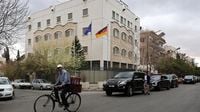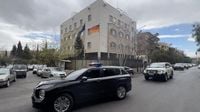Germany has officially reopened its embassy in Damascus, Syria, marking a pivotal moment in international relations as the country navigates the ongoing aftermath of the Syrian civil war. The embassy, which had been dormant since 2012, recommenced operations on March 20, 2025, under the direction of German Foreign Minister Annalena Baerbock. However, the embassy will function in a limited capacity, not accepting German citizens or issuing visas to Syrian nationals.
The reopening comes just three months after the armed opposition seized control of Damascus, ending a dynastic rule that had lasted over half a century. The former dictator, Bashar al-Assad, fled to Russia, while Ahmed ash-Shara was named the transitional president, tasked with leading a government that many hope will bring stability and progress to war-torn Syria.
During the opening ceremony in Damascus, attended by a small number of German diplomats, Baerbock expressed a commitment to work closely with all Syrians for a brighter future for the nation. "We are glad to closely cooperate with all Syrians for a better future for the country," said Stefan Schneck, Germany's special representative for Syria, underlining the collaborative intent moving forward.
Although the embassy's reopening is significant, its operational limitations highlight ongoing challenges. As reported by the embassy's official statement, "The embassy in Damascus remains closed until further notice. In emergency cases, German citizens in Syria cannot count on consular assistance." Instead, visa and consular services will continue to be handled through the German embassy in Beirut, Lebanon, a reflection of the precarious security situation in Syria.
The German government has emphasized the importance of being present in Damascus despite these restrictions. A small group of diplomats is expected to focus on issues of stabilization and reconstruction. This effort, however, will be complicated by unresolved security concerns; some embassy work will be conducted from other locations, details of which remain undisclosed.
Amid these developments, Baerbock has pledged an additional €300 million to support Syria's reconstruction, a move that signals Germany's intent to play a crucial role in the country’s rebuilding process. "Political renewal of relations between Europe and Syria, between Germany and Syria, is possible," Baerbock stated, underlining that any renewal must come with clear expectations about rights, freedoms, and safety for all citizens, regardless of their ethnic or religious backgrounds.
However, as the sentiments of cooperation and reconstruction are voiced, serious questions linger over security and human rights in Syria. Reports have emerged of alarming violence, especially in regions with vulnerable populations such as the Alawites, Druze, and Kurds. Recent incidents in early March raised serious alarms, with around 1,500 people reported killed amid violent clashes involving pro-government forces and Islamist groups. Many victims were reportedly peaceful Alawite residents caught in the turmoil.
Baerbock is acutely aware of these challenges, having called the killing of civilians a "terrible crime" during her visit to Damascus. She and human rights organizations are pressing for accountability from the transitional government regarding these atrocities, although she refrained from directly implicating the new authorities in the violence against Alawites.
The eyes of the international community now turn to Syria as relations begin to shift. While Germany's commitment to maintain a diplomatic presence in Damascus signals a possible thawing of ties, it remains to be seen whether substantive change will follow. With Baerbock's intentions for a collaborative future alongside the complex social fabric of Syria, the pathway toward rebuilding is fraught with challenges but filled with possibilities for Germany's renewed engagement with its Middle Eastern partner.





